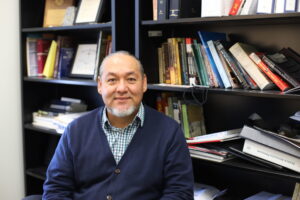Dustin Jansen

On March 12, 2025, Flickinger Boulton Robson Weeks had the privilege of hearing from Dustin Jansen and learning about tribal law.
Born in Coyote Canyon, New Mexico, Dustin Jansen was born on the Navajo reservation and is an enrolled member. He studied at Utah Valley University and received his associates degree in science. He then went to Brigham Young University and received his bachelor’s degree in History, and he later received Juris Doctorate from University of Utah, SJ Quinney College of Law.
After receiving his J.D., Dustin practiced for 15 years as an attorney and judge for the tribal court system. He has also “served as a Judge for the Confederated Tribes of the Goshute Reservation, a Hearing Officer for the Navajo Nation Office of Hearings and Appeals, Pro tem Judge for Zuni Pueblo” and he has been teaching Federal Indian Law & Policy at Utah Valley University since 2015.
Dustin was also recently appointed as Director of the Utah Division of Indian Affairs by Governor Herbert. He also practiced Personal Injury Law, Indian Law, and Immigration Law while in Albuquerque, NM
His role as Director of Indian Affairs, Dustin advises “the Lt. Governor’s office in Indian policy, and law. All aimed at bettering the relationship between tribal governments and the State”. Dustin’s duties as a tribal court judge include presiding over criminal and civil cases that are in the jurisdiction of the tribe. Check out his LinkedIn profile for more information.
Tribal Law

“American Indian tribal law is distinct from federal American Indian Law.” Tribal Law encompasses the “inner workings of specific tribes”, while federal Indian law covers the “relationship between tribes and the federal and state governments”. Each tribe has their own structured government and laws that are similar to the federal branch system. “A tribe may have an executive branch (headed by a governor, president, or chief), a legislature (a tribal council) and a judicial branch (a tribal court)”.
The executive branch enforces laws, manages daily operations, and represents the tribe in external affairs. The tribal courts help with cases in their jurisdiction, like civil cases, minor cases, and family law for tribal members. The tribal courts enforce tribal codes, resolve disputes, and uphold justice within each tribe’s jurisdiction.
One aspect of tribal law is peacemaking, which is a traditional and restorative justice process that has a focus on healing, community harmony, and resolution over punishment. The goal is to restore rather than give blame. Peacemakers are picked for their wisdom and knowledge of the community, and they do not dictate rulings, but they start a dialogue between the opposing sides. This is often used in cases involving minor theft, cases with youths, or domestic conflicts. They note that for these cases, jail time would not be as effective as restoring relationships.
The Navajo Nation’s Utah portion actively uses peacemaking in their court system, while other tribes use it less formally. Peacemaking can be adapted to fit the needs of the tribes in modern times. The Library of Congress has more information and books to read up on tribal law.
The state of Utah has eight federally recognized tribes, which are: the Confederated Tribes of the Goshute Reservation, Navajo Nation, Northwestern Band of the Shoshone Nation, Paiute Indian Tribe of Utah, San Juan Southern Paiute Tribe, Skull Valley Band of Goshute Indians, Ute Indian Tribe of the Uintah and Ouray Reservation, and Ute Mountain Ute Tribe. These tribes all have their own legal system.
Here are some more resources for information about Tribal Law:
- Utah Division of Indian Affairs
- National Indian Law Library
- Utah State Bar Indian Law Section
- Utah Legal Service–Tribal Legal Advocates
- University of Utah S.J. Quinney College of Law
- Tribal Websites
- DNA People’s Legal Services
- BYU Law Library–Free and Low-cost Legal Resources Guide.
You can also look into the Utah State Law Library for physical copies of legal cases and laws. Visit these websites to look into more ways that you can support and learn about Tribal Law and Utah’s American Indian Tribes.
